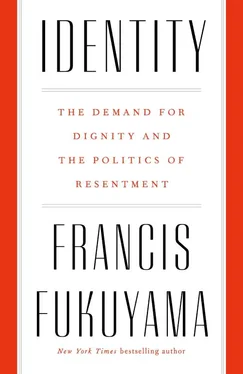The perceived threat to middle-class status may then explain the rise of populist nationalism in many parts of the world in the second decade of the twenty-first century.
In the United States, the working class, defined as people with a high school education or less, has not been doing well over the past generation. This is reflected not just in stagnant or declining incomes and job loss noted in the previous chapter, but in social breakdown as well. This began in the 1970s for the African-Americans who had migrated north in the years following World War II to cities such as Chicago, New York, and Detroit, where many of them were employed in the meatpacking, steel, or auto industries. As these sectors declined and men began to lose jobs through deindustrialization, a series of social ills followed, including rising crime rates, a crack cocaine epidemic, and deteriorating family life that helped transmit poverty from one generation to the next. {6} 6 See inter alia William Julius Wilson, The Truly Disadvantaged: The Inner City, the Underclass, and Public Policy (Chicago: University of Chicago Press, 1988).
Over the past decade, this kind of social deterioration spread to the white working class, as documented by two social scientists at opposite ends of the political spectrum, Charles Murray and Robert Putnam. {7} 7 Charles Murray, Coming Apart: The State of White America, 1960–2010 (New York: Crown Forum, 2010); Robert D. Putnam, Our Kids: The American Dream in Crisis (New York: Simon and Schuster, 2015).
An opioid epidemic has broken out in rural and working-class communities that in 2016 led to more than sixty thousand deaths through drug overdoses, more than the number of Americans killed in traffic accidents each year. Life expectancies for white men have consequently fallen, something remarkable for a developed country. {8} 8 Anne Case and Angus Deaton, “Rising Morbidity and Mortality in Midlife Among White Non-Hispanics in the Twenty-First Century,” Proceedings of the National Academy of Sciences 112 (49) (December 8, 2015); “Mortality and Morbidity in the Twenty-First Century,” Brookings Papers on Economic Activity , March 23–24, 2017.
The number of children growing up in single-parent families has significantly risen; the rate for white working-class children is now 35.6 percent. {9} 9 U.S. Census Bureau, Current Population Survey online data tool.
But perhaps one of the great drivers of the new American nationalism that sent Donald Trump into the White House (and Britain out of the European Union) has been the perception of invisibility. Two recent studies of conservative voters in Wisconsin and Louisiana by Katherine Cramer and Arlie Hochschild, respectively, point to similar resentments. The overwhelmingly rural voters who supported Republican governor Scott Walker in Wisconsin explained that the elites in the capital, Madison, and in big cities outside the state simply did not understand them or pay attention to their problems. According to one of Cramer’s interlocutors, Washington, D.C., “is a country unto itself… They haven’t got a clue what the rest of the nation is up to, they’re so absorbed in studying their own belly button.” {10} 10 Katherine J. Cramer, The Politics of Resentment: Rural Consciousness and the Rise of Scott Walker (Chicago: University of Chicago Press, 2016), 61.
Similarly, a Tea Party voter in rural Louisiana commented, “A lot of liberal commentators look down on people like me. We can’t say the N-word. We wouldn’t want to; it’s demeaning. So why do liberal commentators feel so free to use the R-word [redneck]?” {11} 11 Arlie Russell Hochschild, Strangers in Their Own Land: Anger and Mourning on the American Right (New York: New Press, 2016), 127.
The resentful citizens fearing loss of middle-class status point an accusatory finger upward to the elites, to whom they are invisible, but also downward toward the poor, whom they feel are undeserving and being unfairly favored. According to Cramer, “resentment toward fellow citizens is front and center. People understand their circumstances as the fault of guilty and less deserving people, not as the product of broad social, economic, and political forces.” {12} 12 Cramer, Politics of Resentment , 9.
Hochschild presents a metaphor of ordinary people patiently waiting on a long line to get through a door labeled THE AMERICAN DREAM, and seeing other people suddenly cut in line ahead of them—African-Americans, women, immigrants—aided by those same elites who ignore them. “You are a stranger in your own land. You do not recognize yourself in how others see you. It is a struggle to feel seen and honored. And to feel honored you have to feel—and feel seen as—moving forward. But through no fault of your own, and in ways that are hidden, you are slipping backward.” {13} 13 Hochschild, Strangers in Their Own Land , 143.
Economic distress is often perceived by individuals not as resource deprivation, but as a loss of identity. Hard work should confer dignity on an individual, but that dignity is not recognized—indeed, it is condemned, and other people who are not willing to play by the rules are given undue advantages. This link between income and status helps to explain why nationalist or religious conservative groups have been more appealing to many people than traditional left-wing ones based on economic class. The nationalist can translate loss of relative economic position into loss of identity and status: you have always been a core member of our great nation, but foreigners, immigrants, and your own elite compatriots have been conspiring to hold you down; your country is no longer your own, and you are not respected in your own land. Similarly, the religious partisan can say something almost identical: You are a member of a great community of believers who have been traduced by nonbelievers; this betrayal has led not just to your impoverishment, but is a crime against God himself. You may be invisible to your fellow citizens, but you are not invisible to God.
This is why immigration has become such a neuralgic issue in many countries around the world. Immigration may or may not be helpful to a national economy: like trade, it is often of benefit in the aggregate, but does not benefit all groups within a society. However, it is almost always seen as a threat to cultural identity, especially when cross-border flows of people are as massive as they have been in recent decades. When economic decline is interpreted as loss of social status, it is easy to see why immigration becomes a proxy for economic change.
Yet this is not a fully satisfactory answer as to why the nationalist right has in recent years captured voters who had formerly voted for parties of the left, both in the United States and in Europe. The latter has, after all, traditionally had a better practical answer to the economic dislocations caused by technological change and globalization with its broader social safety net. Moreover, progressives have in the past been able to appeal to communal identity, building it around a shared experience of exploitation and resentment of rich capitalists: “Workers of the world, unite!” “Stick it to the Man!” In the United States, working-class voters overwhelmingly supported the Democratic Party from the New Deal in the 1930s up until the rise of Ronald Reagan; European social democracy was built on a foundation of trade unionism and working-class solidarity.
The problem with the contemporary left is the particular forms of identity that it has increasingly chosen to celebrate. Rather than building solidarity around large collectivities such as the working class or the economically exploited, it has focused on ever smaller groups being marginalized in specific ways. This is part of a larger story about the fate of modern liberalism, in which the principle of universal and equal recognition has mutated into the special recognition of particular groups.
Читать дальше












